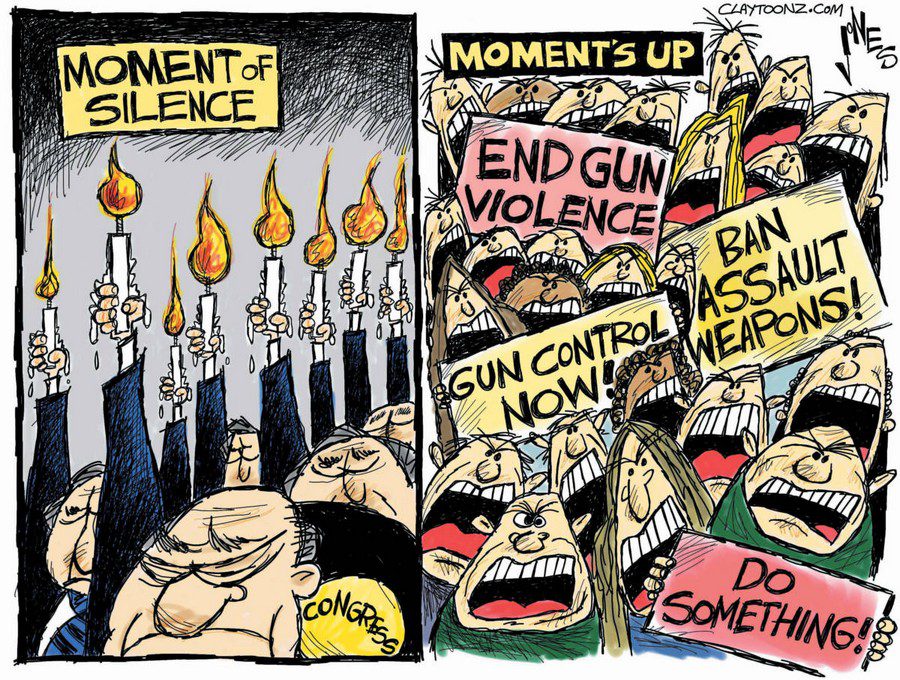
On Sunday night, a domestic terrorist, using weapons suited for battle, took aim from the 32nd floor of a Las Vegas hotel and rained bullets down on a country music festival – killing at least 58 people, wounding more than 500 others and sending a crowd of 22,000 fleeing in panic.
The headlines scream “worst gun massacre in modern history” – and indeed, the massacre surpasses the death toll at the Pulse nightclub in Orlando just last year.
But Las Vegas was also the third deadliest modern terror attack on American soil, trailing only 9/11 and the 1995 bombing of the federal building in Oklahoma City.
America needs to confront this terrorism – and the forces that enable it.
Some definitions of terrorism hold that the violence must be perpetrated toward a political end. We do not yet know the motive behind the targeting of defenseless civilians at a music festival. The alleged gunman, 64-year-old Stephen Paddock, is dead, and the logic of his attack may have died with him. But if a man who brings more than a dozen weapons into a hotel room for the express purpose of exterminating innocent civilians – and prompting tens of thousands of others to flee for their lives – does not qualify not a “terrorist,” then the word has lost any functional meaning.
Mark Kelly – the retired Navy captain and astronaut and husband of former Rep. Gabby Giffords – underscored this idea on Monday. “This is the worst-case scenario. It’s haunted our dreams, that we would wake up to the news of a massacre like this: weapons of war, in the hands of a determined killer, with a tactical advantage. This was an ambush if there ever was one,” he said. “This was domestic terrorism.”
The Las Vegas massacre also plainly qualifies as an “act of terrorism” as defined by Nevada law – encompassing “any act that involves the use … [of] violence which is intended to: Cause great bodily harm or death to the general population.”
The category error – labeling terrorism as “gun violence” – has dire consequences. America is at war with terrorism. We have made peace with gun violence.
In this country, we move heaven and earth to root out terrorism. We’ve launched trillion-dollar wars in Afghanistan and Iraq. Our Congress passed the the USA Patriot Act, and we have curtailed our Fourth Amendment rights – trading freedom for FISA warrants and other encroachments of a surveillance state. We endure the indignities of airport scanners and pat-downs, and perform the security ritual of removing our shoes and belts at TSA checkpoints.
But when terrorists attack with high-capacity rifles, our moral clarity – and our national will to action – falters. Part of this category error is driven by racism. We call white shooters “lone wolves” and not “terrorists.” Regardless, we are enduring terrorist attacks on our own soil. They are hitting soft targets: schools, nightclubs and now music festivals.
Despite the carnage, we have done nothing at the federal level to restrict access to war-bred assault rifles and high-capacity magazines. This is a political problem, not a Second Amendment question. Despite what the NRA claims, U.S. courts have repeatedly held that these weapons are not constitutionally protected.
….
America’s national inaction comes in the face of our enemies laughing at us. Al Qaeda and other Islamist groups have openly called on would-be jihadists to build an arsenal by exploiting America’s lax gun laws, as I detailed after the Orlando attack:
“A terrorist manual discovered in Afghanistan in the early 2000s titled ‘How can I train myself for Jihad’ encourages would-be terrorists to obtain military-grade weapons in America: In ‘some states of USA,’ it reads, ‘it is perfectly legal for members of the public to own certain types of firearms. If you live in such a country, obtain an assault rifle legally….’
“A 2011 Al Qaeda recruitment video included similar advice: ‘America is absolutely awash with easily obtainable firearms. You can go down to a gun show at the local convention center and come away with [an] assault rifle, without a background check, and most likely without having to show an identification card. So what are you waiting for?'”
America’s soft underbelly is vulnerable to terrorist attack because of the political power of the National Rifle Association. Full stop.
And we have never had a president more indebted to the NRA than Donald Trump. Trump took office thanks to more than $30 million in NRA spending on his behalf. Appearing at the gun lobby’s national convention earlier this year, Trump thanked the NRA and promised to advance its agenda. “You came through for me, and I am going to come through for you,” he said.
On Monday, President Trump piously quoted the Bible and condemned an “act of pure evil.” But he made no promise of federal action or intention to prevent future bloodshed. The president only directed that “our great flag” be flown at half mast. In the War on Terror – as prosecuted at home, against those who would commit atrocities with guns – the president might as well be waving a white flag of surrender.
— Tim Dickenson, Rolling Stone Magazine, It’s Time to Politicize the Terror Attack in Las Vegas, October 2, 2017

